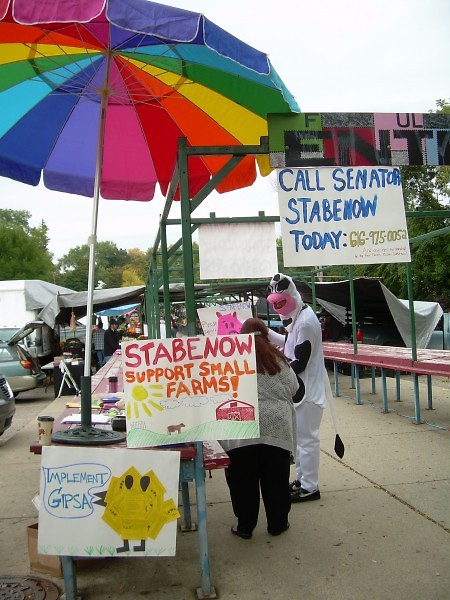Fulton Street Farmer's Market was the backdrop for the local kickoff of a Day of Action for the Fair Farm Bill Campaign.
Food & Water Watch is asking consumers across Michigan to call Senator Stabenow’s office and urge her to call on President Obama and her senate colleagues to implement and defend fair farm rules that will "level the playing field for independent family farmers and in turn benefit consumers." The calls being made in Michigan were part of a Day of Action being conducted by Food & Water Watch and its allies.
They were at the Fulton St Market from 9 a.m. until 2:30 p.m.; there was also an Aquinas call in station in the afternoon. As of 5 p.m. Tuesday evening, they had generated over 150 calls into Senator Stabenow's office, acording to Jane Wiedenbeck, organizer for Food & Water Watch. The event continues through Wednesday, and they hope to have 200 by the end of the day.
Cynthia Price (Chair of the Greater Grand Rapids Food Systems Council) and Tom Cary (Groundswell Community Farm) spoke at the event.
Nationally, nearly 27,000 midsized independent family farms have been driven out of business over the past five years and the ones who have survived are being squeezed by a market that gives preferential treatment to big agribusinesses, says Food & Water Watch. As small and midsized farmers are pushed out of business, consumers are left with fewer healthy, sustainable choices and more antibiotic and artificial hormone ridden meat and poultry. Additionally, when a small number of companies control the market, they have no reason to pass savings on to consumers, which can lead to higher grocery bills, Food & Water Watch explained.
The 2008 farm bill included reforms to protect small and medium-sized farmers who raise cattle, hogs, and chickens. It required the U.S. Department of Agriculture (USDA) to enforce a law called the Packers and Stockyards Act by enacting fair farm rules known as the GIPSA rules (named for the branch of the USDA that would oversee the rules, the Grain Inspection, Packers and Stockyard Administration). The rules prevent meatpackers from giving “undue preference” to large producers, like factory farms, that put small independent producers at an economic disadvantage. Many of the changes are technical, but very meaningful to small and midsized farmers and ranchers. More details on the fair farm rules can be found here.
“Michigan was built on the back of small and midsized farmers and ranchers, and they are being pushed out of the marketplace by federal policies that force them to get big or get out,” said Lynna Kaucheck, Michigan organizer for Food & Water Watch. “As Chair of the Senate Agriculture Committee, Senator Stabenow has the opportunity to stand up for small farmers, consumers and the environment by supporting these fair farm rules, and while the draft rule was released over a year ago, Senator Stabenow has yet to take a public position on this critical issue or press the Obama administration to finalize the rule."
“I have met independent livestock producers from across Michigan and their stories are similar,” said Kaucheck. “When livestock producers go to the sale barn there is usually only one person there buying and that person typically represents several buyers. This makes it very difficult for independent producers to negotiate a fair price for their products. Also, consolidation has done away with nearly all local meat processors forcing Michigan farmers and ranchers to send their livestock out of state to be processed. If Senator Stabenow is serious about protecting jobs in Michigan, she’ll support these rules.”
The Rapidian, a program of the 501(c)3 nonprofit Community Media Center, relies on the community’s support to help cover the cost of training reporters and publishing content.
We need your help.
If each of our readers and content creators who values this community platform help support its creation and maintenance, The Rapidian can continue to educate and facilitate a conversation around issues for years to come.
Please support The Rapidian and make a contribution today.


Comments
By the end of the day on Tuesday, Sept 27, over 260 Grand Rapids residents had called in to Sen. Stabenow's office, asking her to support the Fair Farm Rules!